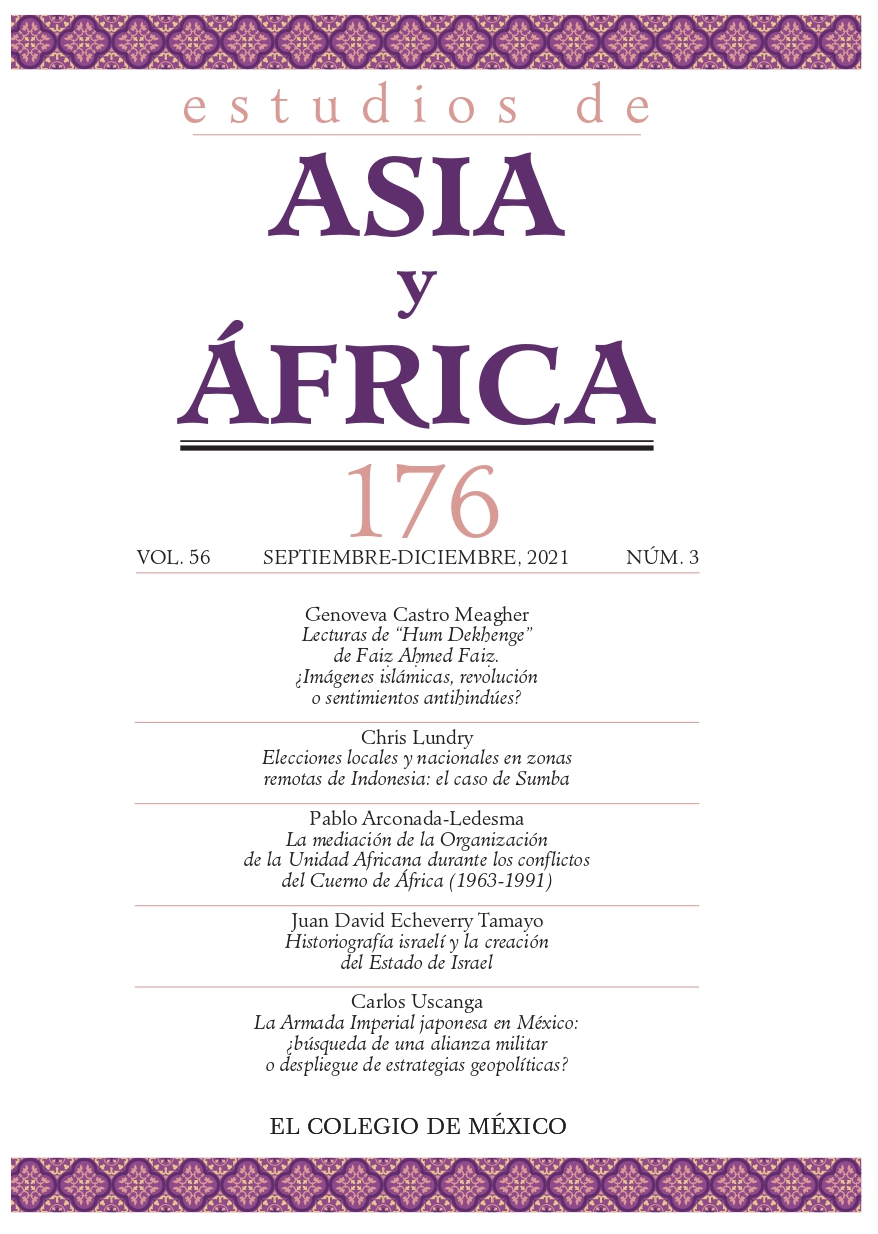Resumen
El artículo examina la controversia generada por el poema “Hum Dekhenge”, de Faiẓ Aḥmed Faiẓ, durante las protestas desencadenadas por la aprobación del Citizenship Amendment Act (Enmienda de la Ley de Ciudadanía) y el National Registry of Citizens (Registro Nacional de Ciudadanos) a finales de 2019 en India. Se explican las circunstancias en las que se originó el debate, se proporciona una semblanza del autor del poema y una traducción al español del texto poético, y se exploran diversas interpretaciones. La producción de significado del poema es una articulación compleja entre el texto, los lectores y el contexto sociopolítico. “Hum Dekhenge” es un poema con varios registros lingüísticos, literarios y políticos. Sin duda, su lectura está abierta a múltiples posibilidades.
Referencias
Adcock, Cassie S. 2016. “Violence, Passion, and the Law: A Brief History of Section 295A and Its Antecedents”. Journal of the American Academy of Religion 84(2): 337-351. https://doi.org/10.1093/jaarel/lfw027
Barthes, Roland. 1977. Image, Music, Text. Traducido y editado por Stephen Heath. Londres: Fontana.
Bukhārī, Muḥammad ibn Ismāʻīl. 2000. Ṣaḥīḥ al-Bukhārī: The Translation of the Meanings of Sahih al-Bukhari: Arabic-English. Traducido por Muḥammad Muhsin Khan. Vol. 5. Al Nabawi’ya: Dar Ahya Us-Sunnah.
Chandrachud, Abhinav. 2020. “Secularism and the Citizenship Amendment Act”. Indian Law Review 4(2): 138-162. https://doi.org/10.1080/24730580.2020.1757927
Chatterji, Angana P., Thomas Blom Hansen y Christophe Jaffrelot. 2019. Majoritarian State: How Hindu Nationalism is Changing India. Nueva York: Oxford University Press. https://doi.org/10.1093/oso/9780190078171.001.0001
Eco, Umberto. 1997. The Limits of Interpretation. Bloomington: Indiana University Press.
Faiẓ Aḥmed Faiẓ. 1982. Mere dil mere musāfir. Delhi: Shāhīn Book Center.
García Bravo, Joaquín, tr. 1982. El Corán. México: Época.
Ḥallāj, al-Ḥusayn ibn Manṣūr. 2018. Hallaj: Poems of a Sufi Martyr. Traducido por Carl W. Ernst. Evanston: Northwestern University Press.
Hawting, Gerald R. 1999. The Idea of Idolatry and the Emergence of Islam: From Polemic to History. Cambridge: Cambridge University Press.
Hayat, Mazhar. 2014. “Marxist Utopia and Political Idealism in the Poetry of Pablo Neruda and Faiz Ahmad Faiz: A Comparative Study”. Tesis doctoral. International Islamic University. http://hdl.handle.net/20.500.12424/1143005
Iqbal, Muzaffar. 2013. “Conversations with Faiz”. En Daybreak: Writings on Faiz, editado por Yasmeen Hameed, 351-359. Karachi: Oxford University Press.
Jalal, Ayesha. 2013. “Freedom Unbound: Faiz’s Prison Call”. En Daybreak: Writings on Faiz, editado por Yasmeen Hameed, 209- 213. Karachi: Oxford University Press.
Jayal, Niraja Gopal. 2019. “Reconfiguring Citizenship in Contemporary India”. South Asia: Journal of South Asian Studies 42(1): 33-50. https://doi.org/10.1080/00856401.2019.1555874
Kantor, Roanne. 2016. “My Heart, my Fellow Traveller: Fantasy, Futurity and the Itineraries of Faiz Ahmed Faiz, South Asia”. South Asia: Journal of South Asian Studies 39(3): 608-625. https://doi.org/10.1080/00856401.2016.1189034
Massignon, Louis y L. Gardet. 2012. “al-Ḥallāḏj”. En Encyclopedia of Islam. Second Edition, editada por Peri Bearman, Thierry Bianquis, Clifford Edmund Bosworth, Emri J. van Donzel y Wolfhart P. Heinrichs. Brill, ed. en línea. https://doi.org/10.1163/1573- 3912_islam_COM_0256
Mufti, Aamir. 2013. “Towards a Lyric History of India”. En Daybreak: Writings on Faiz, editado por Yasmeen Hameed, 216-257. Karachi: Oxford University Press.
Pirzadeh, Saba y Tehmina Pirzada. 2019. “Pakistani Popular Music: A Call to Reform in the Public Sphere”. South Asian Popular Culture 17(2): 197-211. https://doi.org/10.1080/14746689.201 8.1512702
Platts, Johns T. 2007. A Dictionary of Urdu, Classical Hindi and English. Nueva Delhi: Bharatiya Granth Niketan.
Russell, Ralph. 2013. “Faiz Ahmed Faiz: Poetry, Politics and Pakistan”. En Daybreak: Writings on Faiz, editado por Yasmeen Hameed, 38-63. Karachi: Oxford University Press.
Schimmel, Annemarie. 1975. Mystical Dimensions of Islam. Chapel Hill: University of North Carolina Press.
Shahid, Taimoor. 2013. “The Politics of Enchantment: Remapping the Precapital in Faiz Ahmad Faiz’s Postcolonial Poetry”. The Annual of Urdu Studies 28: 215-248.
Swirski, Peter. 2010. Literature, Analytically Speaking: Explorations in the Theory of Interpretation, Analytic Aesthetics, and Evolution. Austin: University of Texas Press.
The Indian Penal Code. 1860. https://www.indiacode.nic.in/bitstream/123456789/4219/1/THE-INDIAN-PENAL-CODE-1860.pdf
Vassilyeva, Ludmila. 2013. “Faiz and the Soviet Union”. En Daybreak: Writings on Faiz, editado por Yasmeen Hameed, 191-208. Karachi: Oxford University Press.
Williams, Richard David y Rafay Mahmood. 2019. “A Soundtrack for Reimagining Pakistan? Coke Studio, Memory and the Music Video”. BioScope: South Asian Screen Studies 10(2): 111-128. https://doi.org/10.1177/0974927619896771
Zaidi, Ali Shehzad. 2019. “Imprisonment as the Gateway to Wonder in the Poetry of Faiz Ahmed Faiz”. Socialism and Democracy 33(2): 142-150. https://doi.org/10.1080/08854300.2019.1647701
Esta obra está bajo una licencia internacional Creative Commons Atribución-NoComercial-SinDerivadas 4.0.
Derechos de autor 2022 Estudios de Asia y África



